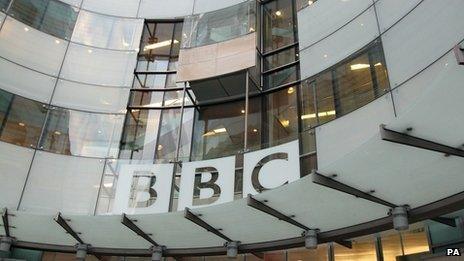'Confusion' led to BBC digital project failure
- Published

Confusion and a lack of planning were the reasons behind the failure of the BBC's £98.4m Digital Media Initiative (DMI), according to a report.
A failure to understand the problems the project faced also led to its cancellation, the National Audit Office said.
The BBC's technology chief John Linwood was sacked in July over the project's demise.
DMI had been intended to move the BBC away from using video tape.
The plans - which were supposed to produce new in-house production tools, an online digital archive and a new database - were shelved in May, when the BBC's director general, Tony Hall, admitted it had "wasted a huge amount of licence fee payers' money".
The gross estimate of the amount spent on DMI was £125.9m, although the net cost to the licence fee payer was estimated to be £98.4m.
Mr Linwood revealed in written evidence published by the Commons public accounts committee on Tuesday that he is taking legal action against the BBC.
"I have issued legal proceedings against the BBC and intimated contractual claims, and am still involved in an internal process with the BBC," he wrote.
Amyas Morse, head of the NAO, said on Tuesday: "The BBC Executive did not have sufficient grip on its digital media initiative programme. Nor did it commission a thorough independent assessment of the whole system to see whether it was technically sound.
"If the BBC had better governance and reporting for the programme, it would have recognised the difficulties much earlier than May 2012."
The NAO report, which was commissioned by the BBC, concluded it had been "too optimistic about its ability to implement it [DMI] and achieve the benefits".
It added that confusion about the technology and problems with getting the system to work had also been to blame, including "confusion within the BBC about the use of key terms such as 'archive database' and 'digital archive'."
DMI was set up in 2008 but was halted last autumn having never become fully operational.
The NAO report said the BBC had hoped to save £98m in the long run through the new systems - but in the end, the final estimate of the benefits it brought to the BBC was zero.
The report criticised governance of the project, pointing out that the BBC had not appointed a senior person to act as a single point of accountability and bring all the strands of the initiative together.
It also said that reporting arrangements had been "not fit for purpose", with no "clear and transparent reporting" on the project's progress or lack of.
The NAO office also said the BBC's executive board had not applied enough scrutiny to the project during the key period of 2011 and the first half of 2012, when completion dates were being pushed back.
The BBC had identified the relocation of some of its departments to Salford in 2011 as a critical deadline - but when BBC Sport moved to Salford, it bought in an off-the-shelf digital storage system at a cost of £800,000 because DMI was not ready.
Some smaller parts of DMI still went ahead, including a replacement music reporting system.
The report also concluded that while the BBC Trust questioned the executive board in September 2011 about delays and the impact of them, it did not challenge it sufficiently until July 2012.
The BBC admits it got it wrong and has now adopted new procedures for managing big projects.
Diane Coyle, vice chairman of the BBC Trust, said: "As we announced last December, we are working with the executive to strengthen project management and reporting arrangements within a clearer governance system. This will ensure that serious problems can be spotted and addressed at an earlier stage."
A separate statement released by the BBC executive board said: "We are grateful to the NAO for its report. As we have previously acknowledged, the BBC got this one wrong. However, we have taken swift action to overhaul how major projects are managed after the new management team closed DMI last year."
- Published24 January 2014
- Published18 December 2013
- Published10 June 2013